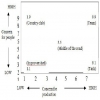Home | ARTS | Management Concepts & Organisational Behaviour
|
Contingency Model of Power - Organisational Power & Politics
Management Concepts & Organisational Behaviour - Organisational Power & Politics
Contingency Model of Power - Organisational Power & Politics
Posted On :
According to this model, target will comply to gain or avoid punishment.
Contingency
Model of Power
According to this model, target will comply to gain or avoid punishment. In order to gain compliance to work, the superiors must be able to reward and punish subordinates and keep surveillance over them. But the agent must have referent power, that is, very attractive to the target. The agent must also be in the forefront of targets awareness. People will internailse because of compatibility with their own value structure. For people to internalize the agent must have expert or legitimate power and be relevant. Internalized power has a lasting impact.
Let us understand how employees in oranisations translate their power bases into specific actions. Findings of research on managers identified seven power tactics:
1. reason;
2. friendliness
3. collation (getting the support of other people in the organisation to back up the support);
4. bargaining (negotiations for exchange of favours);
5. assertiveness;
6. higher authority (gaining the support of higher levels in the organisation to back up requests);
7. sanctions (using organizationally derived rewards and punishments).
Manager’s relative power in the organisaton determines tactics selection. They also change their tactics depending upon their objectives in the upward and downward influences. Choice of tactics depends upon expectations of success. Assertiveness and sanctions are used when success is less predictable. Different cultures prevalent in the organisation also have significant bearing on the choice of power tactics.
According to this model, target will comply to gain or avoid punishment. In order to gain compliance to work, the superiors must be able to reward and punish subordinates and keep surveillance over them. But the agent must have referent power, that is, very attractive to the target. The agent must also be in the forefront of targets awareness. People will internailse because of compatibility with their own value structure. For people to internalize the agent must have expert or legitimate power and be relevant. Internalized power has a lasting impact.
Power Tactics
Let us understand how employees in oranisations translate their power bases into specific actions. Findings of research on managers identified seven power tactics:
1. reason;
2. friendliness
3. collation (getting the support of other people in the organisation to back up the support);
4. bargaining (negotiations for exchange of favours);
5. assertiveness;
6. higher authority (gaining the support of higher levels in the organisation to back up requests);
7. sanctions (using organizationally derived rewards and punishments).
Manager’s relative power in the organisaton determines tactics selection. They also change their tactics depending upon their objectives in the upward and downward influences. Choice of tactics depends upon expectations of success. Assertiveness and sanctions are used when success is less predictable. Different cultures prevalent in the organisation also have significant bearing on the choice of power tactics.
Tags : Management Concepts & Organisational Behaviour - Organisational Power & Politics
Last 30 days 648 views













